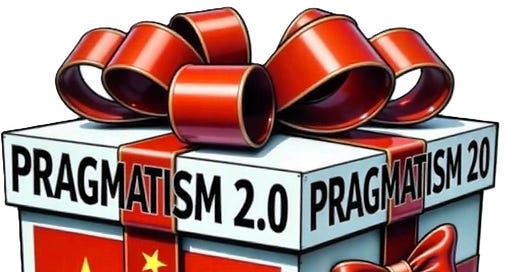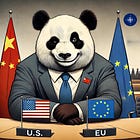Despite rocky ties with Trump, Europe remains wary of China, Plus Beijing hits US with tariffs on $21b in agriproducts -- China Boss News 3.7.25
Newsletter
What happened?
Not all that long ago, China's "wolf warrior" diplomacy alienated its neighbors and drove them closer to the US.
Now, things might be reversing.
With Trump back in office, the US is becoming an unpredictable force, wielding economic threats against rivals and allies.
From advocating for the forced expulsion of Palestinians from Gaza to pressuring Canada, Mexico, and Panama, Trump's approach is testing the limits of US influence.
And European backlash is mounting.
Leaders in Germany and France have openly criticized Trump's policies, while smaller nations are recalibrating their strategies—just as they once did in response to China's aggressive diplomacy.
Trump's support for far-right European factions, his alignment with Russia at the UN, and his threats of heavy tariffs on EU goods have left Europe deeply unsettled about its future.
Why it matters.
Repackaging
As a result, Brussels is actively discussing ways to "de-risk" from US influence, even as the EU remains wary of China's expanding footprint.
As Howard W. French wrote earlier this month in Foreign Policy:
"In a world where China may already be wealthier than the United States by some measures, what will happen if the United States jettisons its values, trashes its institutions, and continues to throw its weight around? What would the argument be for siding with Washington versus Beijing anymore or forging other alliances and arrangements? If the United States continues down its present path, we may soon find out.
Said differently, if Washington prioritizes raw power over its values and alliances, the world - including Europe - may follow another power's lead.
And China wants very much to be that power.
Beijing is seizing the moment again to position itself as a champion of pragmatism and multilateralism.
The former is a throwback to a time when German Chancellor Angela Merkel's China policy favored stable economic relations over defending democratic values and security —a stance that greatly benefitted China and the German business elite but one that has drawn much criticism in recent years.
The latter, of course, is China and Russia's attempt to reshape the narrative of US hegemony—an argument that has become more persuasive during the Trumpian era.
According to Finbarr Bermingham at the South China Morning Post, Wang assured Kaja Kallas, the EU's top diplomat, at the Munich Security Conference that Beijing supported Europe and Ukraine having a role in peace talks—a stark contrast to Trump, who dismissed European involvement.
"Over the years, some have been saying that China is attempting to change the order and China wants to start a new system," Wang said in his public remarks at the Conference.
"Now we don't see much talk of that because now there is a country that is withdrawing from international treaties and organizations and I think in Europe, you can feel chills almost every day," the "silver fox" added.
But China has not offered anything concrete or new to mend its strained relationship with Europe.
Instead, it has revisited familiar demands, primarily pushing for the revival of an investment pact that stalled in 2021 amid mutual sanctions over alleged human rights abuses in Xinjiang.
In meetings with sanctioned lawmakers and academics in Brussels and Munich, Chinese officials have rebranded their request for mutual sanctions removal but maintained the same core demand.
Rise of the Eastern China skeptics
China's charm offensive hasn't quite yet won over Europe, however.
Major concerns, including industrial overcapacity, market access, and human rights violations, still weigh heavily on relations.
While some EU nations are open to a softer approach, skepticism remains high, particularly given Beijing's close ties to Russia.
Trump's policies may force Europe to reconsider its alliances, but China's alignment with Moscow is the super gummy sticking point.
Germany, now under the leadership of Friedrich Merz, is at the center of Europe's strategic recalibration.
A strong advocate of transatlantic ties, Merz has voiced concerns about NATO's future and the US shifting foreign policy.
However, Germany's deep economic links with the US and rising security concerns over Beijing make a drastic policy shift unlikely.
While economic cooperation with China may increase to counterbalance Trump's tariffs, key areas like technology and security will remain closely guarded.
That said, Germany's once-undisputed dominance in Europe's economy is no longer a given.
With an economy heaving under sluggish growth, high energy costs, weakened industrial output, and persistent inflation, its long-standing role as Europe's economic powerhouse is under duress.
In stark contrast, Eastern and Central European nations, especially those bordering Russia, are seizing the reins of the bloc. With their influence surging amid the security threat from Russia's invasion of Ukraine, they are rapidly reshaping the EU's internal balance of power.
Many of these countries, once hesitant about full Western alignment, are now some of China's most vocal critics.
Lithuania, Latvia, and Estonia have distanced themselves from Beijing, citing its support for Russia's war in Ukraine. Even Poland, once open to engagement with China, has rejected Beijing's overtures outright.
China's once-promising '17+1' framework for engaging Central and Eastern Europe is collapsing.
Lithuania's bold move to embrace Taiwan marked a pivotal moment, setting the stage for others to follow. However, Poland has emerged as the real powerhouse. Its status as the EU's fifth-most populous nation and one of Europe's fastest-growing economies has solidified its political clout, driven by deepening ties with Western security and political frameworks.
As Europe's eastern flank prioritizes security and NATO alliances over economic enticements from China, it is also pulling Brussels—the bloc's decision-making hub—along with it.
Europe remains a major player in geopolitics, with significant influence due to its vast market and control over key exports, such as semiconductor technology from Dutch giant ASML.
Yet Brussels understands the EU cannot afford to replace one dependency with another.
While China might serve as a counterweight to Trump's unpredictability, the challenge lies in striking the right balance.
Europe needs to make smart strategic choices in the coming years to strengthen its foothold in a rapidly changing world—otherwise, it risks being pulled into other powers’ orbits.
This Week's China News
The Big Story in China Business
CHINA PUTS TARIFFS ON $21B IN US AGRICULTURAL PRODUCTS: In swift retaliation to President Trump's latest tariff hikes, China has imposed fresh levies on $21 billion worth of US agricultural and food products—an economic punch to American farmers.
Beijing's response didn't stop there.
Keep reading with a 7-day free trial
Subscribe to China Boss News to keep reading this post and get 7 days of free access to the full post archives.





